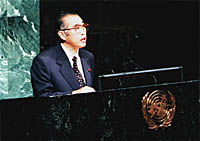Japan's Policy Toward The United Nations in the Post-Cold War World

Foreign Minister Keizo Obuchi addressing the 52nd Session of the U.N. General Assembly on September 23, 1997
The world has undergone structural changes with the end of the Cold War, and the international community is striving to create a new framework for peace and prosperity. On the political front, every effort is being made to find guarantees for peace and security. On the economic front, the international community is working to ensure and increase prosperity while addressing such global issues as the environment and the population problem. Creating a new framework to achieve those goals will require considerable effort. As the international community works toward a solution, it is vital to look at the United Nations, the only international organization with near universal representation. We should make efforts to strengthen its functions by implementing reforms in order to reflect the reality of today's world.
Since the end of World War II, the principle of assigning a central role to the United Nations has been one of the main pillars of Japan's foreign policy. In addition to contributing personnel and financial support to peace-keeping operations and other U.N. efforts to safeguard peace and security, Japan is committed to implementing reforms that will strengthen the United Nations.
Back to Index
